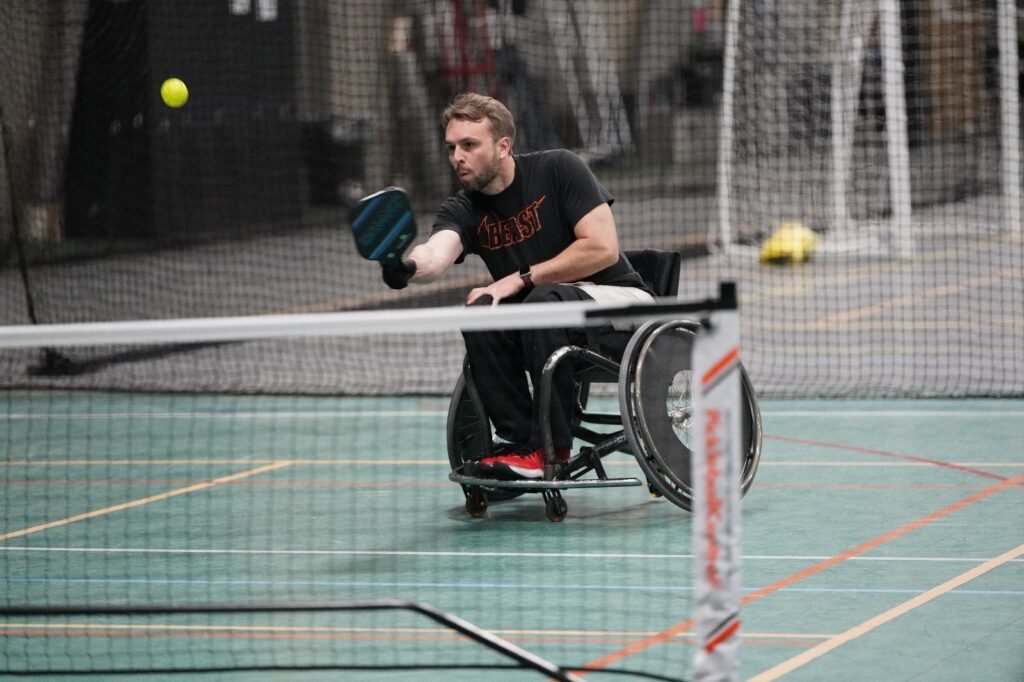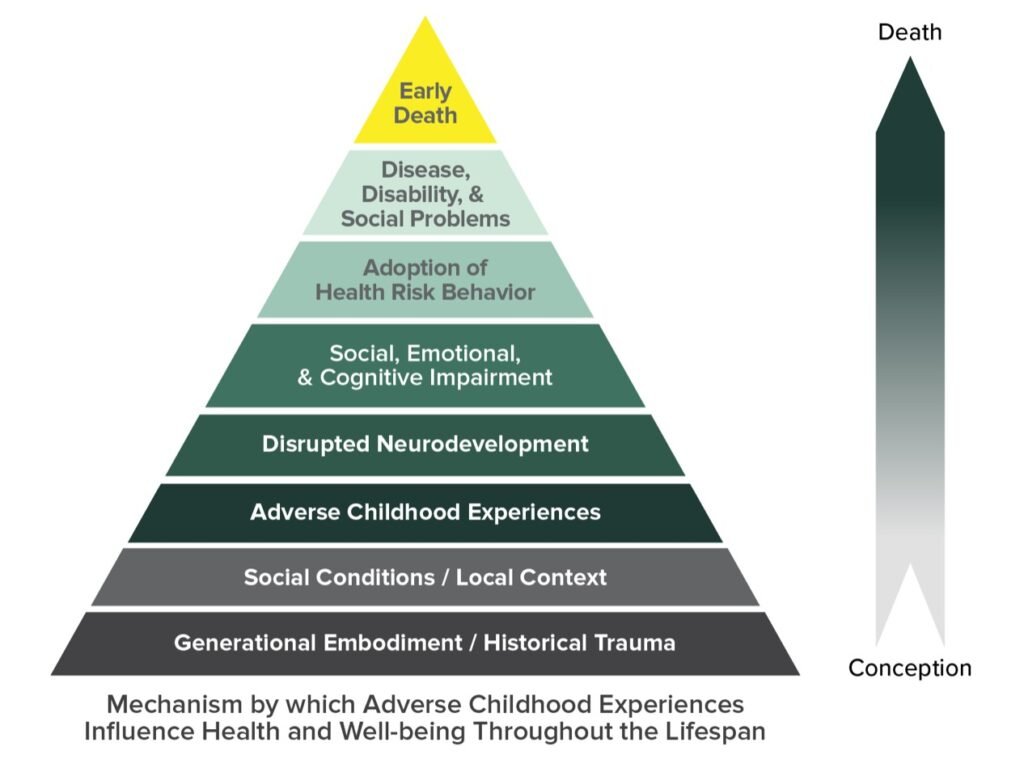Specialties
Home / specialties
ABOUT
TRAUMA & ADVERSE EXPERIENCES
The image shown illustrates how ACEs (Adverse Childhood Experiences) influence health and well-being throughout the lifespan. People who had 4 or more ACEs (e.g. psychological, physical, or sexual abuse; violence against mother; or living with household members who were substance abusers, mentally ill or suicidal, or ever imprisoned) were 4 to 12 times more likely to experience health risks, alcoholism, drug abuse, depression, and suicide attempts later in life. Even lower numbers of ACEs increase health risks and may make people more vulnerable to developing posttraumatic symptoms following a traumatic event later in life. I provide the information from this study to hopefully produce some understanding and compassion for yourself if you have been struggling with physical and/or emotional difficulties that are confusing and persistent.
Even if there is not a clear connection in your mind between an ACE or adult trauma and the current challenges you are experiencing, your physical and/or psychological symptoms could be an expression of an unresolved painful event. I am trained in EMDR (Eye-Movement Desensitization and Reprocessing), an evidenced-based treatment approach for trauma and adverse experiences. Whether EMDR is the right approach for you or not, I have successfully traversed through the effects of multiple traumas in my own life, which aids me in understanding others experiencing the effects of trauma. Having been through the fear, anger, sadness, and confusion, I will not turn away from your pain or offer meaningless platitudes. The road through trauma can be daunting, but by facing the fear, instead of avoiding unpleasant reminders, you can learn how to hold your pain with compassion and gain meaning that will carry you forward with the strength and resilience that only survivors of trauma can understand.

ABOUT
ANXIETY
Stress alone is not necessarily a bad thing. Stress can increase your brain's performance, boosting energy and memory; motivating you to overcome challenges, meet goals and accomplish tasks more efficiently. On the other hand, chronic stress can lead to or exacerbate such conditions as anxiety, obesity, insomnia, auto-immune disease, high blood pressure and depression.
Effectively treating anxiety means creating a balance, specifically a balance between the sympathetic nervous system (fight/flight/freeze) and the parasympathetic nervous system (rest and digest). The body regulates these systems by integrating information sent from the brain to the body, and from the body to the brain. So it is important to utilize treatments that deal with the brain and body.
I have experience in biofeedback, which uses sensors that reflect real time physical information, such as heart-rate variability and muscle tension, to aid in emotional and physical regulation. You can actually see your body react to thinking and behaving differently! I use this information to improve clients' ability to relax their minds and bodies, so they can learn to put themselves into the "rest and digest" response more frequently. I have accumulated a variety of techniques that will help your mind and body become calmer overall and reduce the chance that anxiety will cause negative health consequences.

ABOUT
DEPRESSION
Depression is often a mix of emotional and physical symptoms including hopelessness, fatigue, significant weight gain or loss, low self-worth, etc. This combination of symptoms requires physical and emotional approaches, so while we work through the mental and emotional challenges in sessions I encourage clients with depression to be assessed by their primary doctor, evaluate their nutritional intake, and begin a regular exercise program. To start making progress with depression one must get their natural "happy" neurotransmitter levels up. A healthy diet, exercise, and if necessary medication, will improve mood and make the mental and emotional changes easier and long-lasting.

ABOUT
ADDICTION
If you are wondering if you have an unhealthy addiction to drugs, alcohol, eating, gambling, or pornography, then you are part way down the path to recovery. Getting past the denial involved with addiction is a difficult hurdle. I know it took me years to recognize and admit that my opioid pain medication use had turned into abuse and addiction. Addiction is so insidious because something that once brought you pleasure or relief has turned into something damaging. Once you recognize that a substance or behavior has lead to negative changes in your social, familial, occupational, physical, and/or emotional health, the path towards healing can begin.
I know my path to recovery may look different than your path, and I honor and respect however you find your way back to health and clarity. There are commonalities I have seen between my and other's recovery, such as a meaningful motivator to change, regular exercise or other self-care, support, medical providers who understand addiction, and developing a social life that does not center around substances and unhealthy behavior. I can help you figure out a plan that will lead to recovery, and provide understanding because that plan may not be a straight path towards recovery. Lapse or relapse is a part of recovery, and it does not mean failure, as long as you keep trying.

ABOUT
CHRONIC PAIN / ILLNESS / DISABILITY
Living with a chronic disability or illness can be an incredibly challenging journey, one marked by both physical and emotional hurdles that often go unseen by those who haven't walked the same path. It's like navigating through a maze where every turn presents a new obstacle, and there are days when the weight of it all feels unbearable.
At the heart of this experience lies a constant struggle between acceptance and defiance. There's a longing to reclaim a sense of normalcy, to participate fully in life's activities without the limitations imposed by one's condition. Yet, there's also a profound resilience that emerges from within, a resilience born out of necessity, out of the need to adapt and survive in a world that doesn't always accommodate differences with ease.
Living with a chronic disability or illness means facing a barrage of uncertainties on a daily basis. It means grappling with the unpredictability of symptoms and the frustration of not knowing what each day will bring. It's a relentless battle against pain, fatigue, or whatever form the illness may take, a battle fought not just with medication and treatment, but with sheer willpower and determination.
But amidst the struggle, there's also a deep well of courage and strength that defines the lived experience of those with chronic conditions. It's the courage to keep going even when every step feels like a monumental effort, the strength to find joy and meaning in life despite the challenges that loom large.

Living with a chronic disability or illness often means confronting not only physical limitations but also societal stigma and misconceptions. It can be isolating, as others may struggle to understand the realities of your experience or may inadvertently contribute to feelings of alienation. Yet, it's also an opportunity for education and advocacy, a chance to raise awareness and foster empathy in a world that sorely needs it.
Above all, living with a chronic disability or illness is a testament to the resilience of the human spirit. It's about finding beauty and hope in the midst of adversity, about cherishing the moments of joy and connection that punctuate the journey. Despite the challenges we face, we are capable of great courage, compassion, and resilience, and our worth is not defined by our limitations but by the strength of our spirit.
I know first hand how it feels to live with chronic disability and health problems because I have been living with complete paralysis from the chest down since I was 17 yrs. old. I don't know how your experience with health challenges feels, until you tell me, because everyone has unique differences. Every person who I have met living with paralysis and using a wheelchair has aspects of their lived experience that are different than mine, with some common themes. For example, the worry and pain of exclusion when spaces are not created to accommodate our physical and psychological differences. I will not assume that your pain is the same as mine, and I believe navigating the world with a disability will help me to attune and understand you, and ultimately provide the best support and encouragement you need.

ABOUT
PARENTING DIFFICULTIES
My approach to parental coaching goes along with my practice name, "Calming Presence." Kids, God love em', will bring the drama at many different points throughout their development, and ideally the parent can remain a calming presence during these times. Kids' frontal lobes, the rational decision making area of the brain, are still developing well into their twenties, and sometimes it is the fight/flight/freeze parts of the brains and nervous systems that take control. When this happens, parents will also feel their fight/flight/freeze parts getting activated. I help parents develop tools to manage their own anxiety, stress, fear, anger, and confusion, while sticking firm to the values they are trying to model and teach to their children.
Ask yourself these questions: 1) Do I have a philosophy about discipline?, 2) Is this philosophy allowing me to teach my children the lessons I intend?, 3) Do I feel good about my relationship(s) with my children?, 4) How open am I to admitting mistakes when I make them? If you feel you cannot answer these questions positively, then please allow me to be a support and help you find the parenting answers that are congruent with your values.


